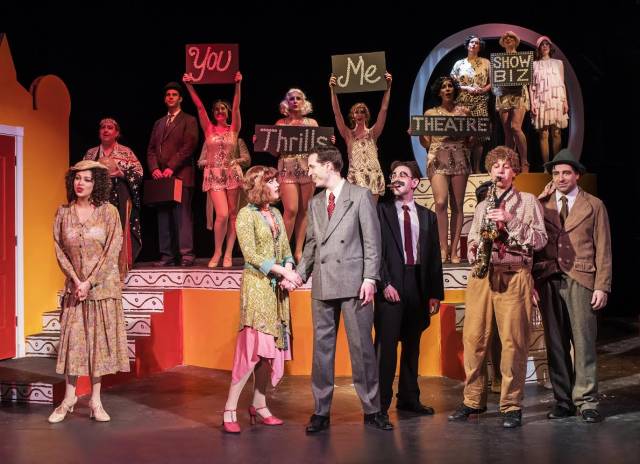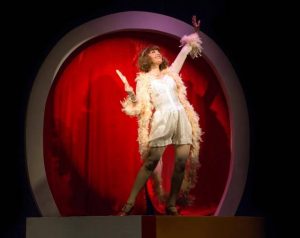

Before the filmed versions of their Broadway successes The Cocoanuts and Animal Crackers pulled the Marx Brothers into Hollywood immortality, there was their 1924 Broadway debut, I’ll Say She Is. The show—which had played on the road for 18 months before arriving at New York’s Casino Theater —was a watershed event in the team’s history. It allowed Groucho, Chico, Harpo and Zeppo to take all they had learned in their vaudeville years and showcase it for Manhattan audiences. The show helped define—and validate—the Marxes’ comedic brand. As biographer Simon Louvish wrote in 1999, “With hurricane force, [the brothers] were sweeping the uncouth world of the vaudeville entertainers on to the ‘legitimate’ stage….”
Actor-writer Noah Diamond has spent the last seven years reconstructing this “lost” Marx Brothers musical, adapting and expanding Will B. Johnstone’s original libretto and lyrics. He has also written and published a book about the show. And to top things off, he plays Groucho in the current production at the Connelly Theater, directed by Amanda Sisk. (A previous incarnation of the show was reviewed for StageBuddy by Jose Solis in 2014.)
Diamond’s re-animated I’ll Say She Is would certainly be a welcome addition to the seasons of theatre companies around the country and beyond. It’s a loosely plotted “book” show, with just enough dramaturgical heft to set it apart from a revue, though you won’t need a synopsis printed in the program to follow the action.

A bored heiress named Beauty (Melody Jane) promises—to the consternation of her Margaret Dumont-ish Aunt Ruby (Kathy Biehl)—to bestow her fortune on the man who can give her the thrill of her life. A series of wild adventures and excruciating puns ensues as the “Four Horsemen of the Apoplexy” strive to capture the prize. The scenes zip from Wall Street to Central Park, to the court of Napoleon in Versailles, to a Chinatown opium den.
The production has many splendid moments, both comedic and musical. Although Groucho once maligned Tom and Alexander Johnstone’s score as “the most undistinguished one that ever bruised the eardrums of a Broadway audience,” musical director Sabrina Chap’s arrangements here help make several of the songs infectious. (There’s not much anyone could do, however, to salvage a second-act number called “The Inception of Drapery”). The show has an all-female chorus of eleven who add greatly to the fun, especially during choreographer Shea Sullivan’s tap sequences.
Some comic bits are staged deftly, but at the performance I saw, the pacing lagged in places. (For one thing, crew members moving furniture on and off the stage frequently puts a drag on the proceedings.) Not every actor is pitch perfect, but Jane’s spirited Beauty has a fetching trill that calls to mind ingénues in early talkie musicals. Matt Walters displays a warm singing voice as Zeppo. Matt Roper sounds much like the original Chico, though his comic timing wavers a bit.
Diamond’s youthful-looking Groucho and Seth Shelden’s sweetly impish Harpo are audience favorites. Shelden’s cutlery-spilling bit proves hilarious and his harp solo is impressive, but there is something about the way he and his clarinet drift through the opium den scene that effortlessly captures the very essence of Harpo.